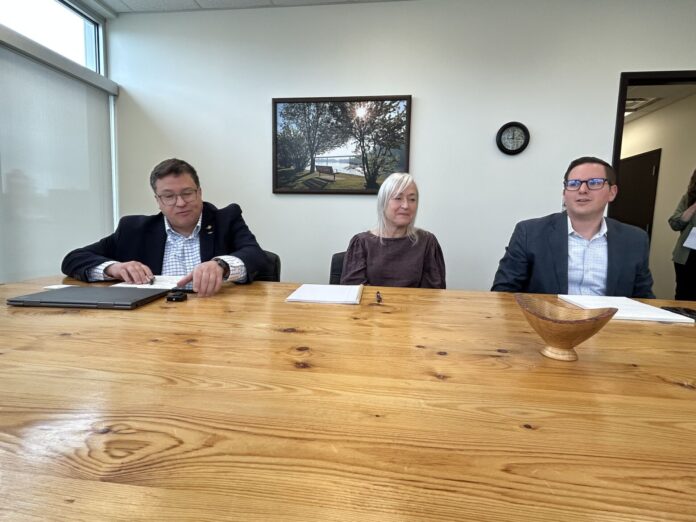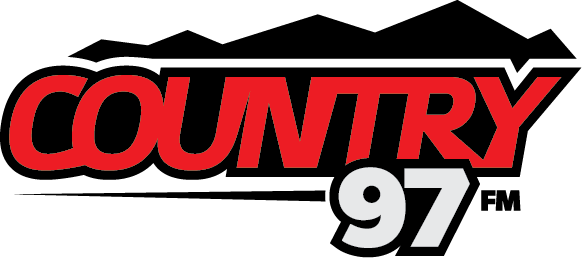A trio of opposition MLAs gathered in Prince George this morning (Friday) to talk about some of the challenges the health care system in the province is facing, particularly in the North and in rural areas.
“It’s obvious to everyone the provincial health care system is broken for a whole bunch of reasons, from successive governments over a long period of time,” said Prince George-North Cariboo Conservative MLA Sheldon Claire.
“Fixing it is going to present some challenges, and I guess that’s what we’re here to talk about.”
Prince George-Mackenzie MLA Kiel Giddens said what they’re focused on as the opposition is the local stories around health care that are being heard around the province.
“One of the most memorable question periods that we had in the legislature was when we actually had 20 opposition MLAs get up and asked questions about ER closures across the province, a very serious issue,” he said.
“We also asked many questions about UHNBC, including the lack of forensic psychiatric care here in Northern Health, we’re the only health authority in the entire province that doesn’t have any secure forensic care. There’s only access to three beds down in Kamloops.”
Giddens said there are many other issues, including cardiac care and a lack of clarity around the helipad at the patient care tower at UHNBC.
“We’ve been trying to seek clarification on whether that government is actually going to do what they said they were going to do right before the election,” he continued.
“David Eby made a commitment to putting a helipad as part of the concept plan. We still have not seen that plan. We still have not seen any evidence in the budget or in any documentation that it is actually in fact going to happen, so we’ve been trying to get these answers.”
Joining Claire and Giddens today was Conservative Health Critic and North Island MLA Anna Kindy. Kindy graduated from the University of Alberta Medical School in 1986, and has practiced as a family doctor.
“This government is not planning, it’s all band-aid solutions,” she said.
She said things such as ER closures are just at the tip of the issue.
“We’re looking at lack of primary care access, lack of ability to see a specialist, wait times are completely unacceptable and people are dying on the list waiting, it’s even worse in rural areas,” Kindy said.
“I’ll just pick neurology, for example, I talked to one of the neurologists in Vancouver, he started a stroke program, and what he told me was to see him in Vancouver, a referral will take a year, so he’s busy triaging, trying to figure out what needs to be seen first. If you’re from a rural area, to see a movement disorder specialist can take up to two to three years, Parkinson’s, two to three years to see him.”
Claire added he believes there is a serious problem with the “competitive relationships between communities” when it comes to attracting medical professionals.
“You have one community recruiting and trying to compete with the community next door in the recruiting process to get doctors,” he said.
“I think there has to be a much more collaborative approach and to provide incentives to bring the medical professionals where they’re needed, because we’re seeing a real exodus, particularly in the North and rural areas of this province, and it is just killing us, quite literally.”
Kindy added we’re not producing enough doctors in BC.
“There’s a lot of Canadians that would be excellent doctors and we need to produce more physicians, more primary care providers but also more overall,” she said.
“There’s a demographic in the physician world as well where 40 per cent of GPs will be retiring in the next five years, and were talking the same, pretty close probably with specialists, and we’re not increasing medical school enrollment.”
Kindy said increasing school enrollment should start now, as it will provide more specialists in ten years.
She added we need to start looking at how to increase the pool right now.
“We have Canadians that have gone to very reputable medical schools outside our borders, Ireland, Australia, New Zealand, and the have a hard time coming back to our country, and they’re Canadians, we need to open those doors,” she said.
“We need to start making it easier for foreign graduates, people that are working here that have degrees, but we also have to make sure we keep the quality up. Some are definitely excellent, and I’ll be honest, some are not.”
Kindy said if they prove to be well-trained, it should be made easier to get them practicing medicine.
Claire added we have to be careful about taking medical professionals from other countries to avoid transferring our problems to them.
“I know we’ve had a lot of doctors come from South Africa because of the way that the system was working there,” he said.
“I think there have been some changes, and we’ve certainly benefitted from getting high quality physicians from that part of the world to be working in British Columbia, and it’s been a great boon, but at the same time, just going and grabbing them from other countries isn’t the solution.”
Claire agreed that increasing our capacity for our medical schools to train medical professionals here is key.
Kindy added the problem isn’t enough spaces in these programs.
“There are many smart people applying and not getting in, that’s not the problem,” she said.
“The costs, when you look at medical school, it’s the same teacher, you can teach to 100 or 200, it’s the same teacher, so it wouldn’t increase the cost that much if you look at the logistic of it.
Kindy added because the need is so high, costs for bureaucracy within health authorities should be diverted to medical schools.
Something going on in the Prince George area you think people should know about?
Send us a news tip by emailing [email protected].







